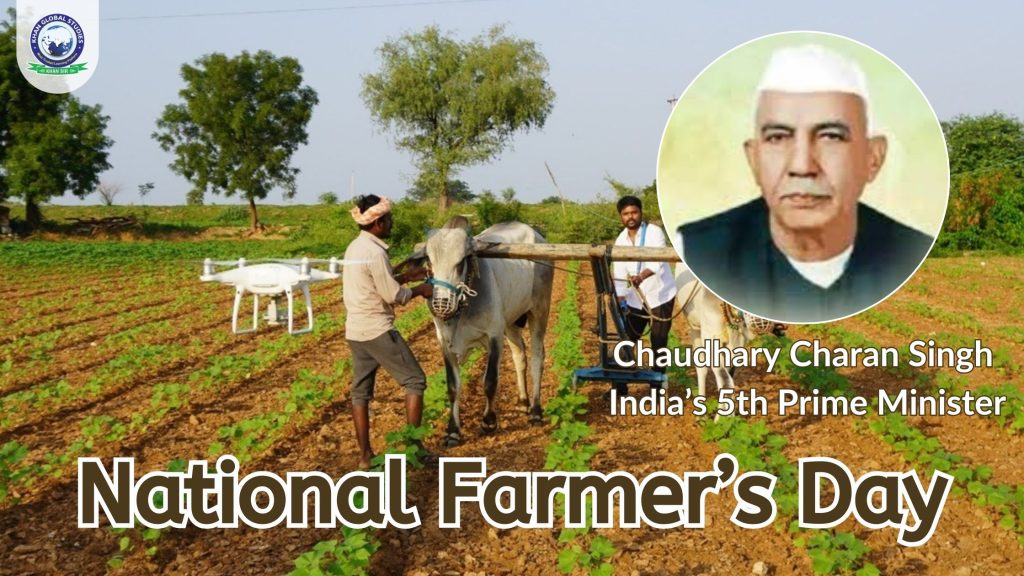Kisan Diwas, also known as National Farmers’ Day, is celebrated across India every year on 23rd December. This day is dedicated to honouring the immense contributions of farmers to the nation and raising awareness about their rights and welfare. Farmers are the backbone of India’s economy and the cornerstone of rural prosperity. The date marks the birth anniversary of Chaudhary Charan Singh, India’s fifth Prime Minister, who was himself a farmer and is remembered for his significant efforts toward the welfare of farmers.
In this article, we will explore the significance of this day, its history, and some intriguing facts about the life of Chaudhary Charan Singh.
History of Kisan Diwas
Chaudhary Charan Singh served as India’s fifth Prime Minister and focused his policies and work entirely on rural development and agricultural reforms. He introduced numerous initiatives and reforms aimed at addressing the challenges faced by farmers and improving their welfare. His efforts were instrumental in strengthening India’s agrarian economy.
Between 1979 and 1980, during his tenure as Prime Minister, Chaudhary Charan Singh implemented several policies and programs to support agriculture and rural communities.
India, known as a country of villages and agricultural abundance, relies heavily on agriculture, with almost 50% of the population depending on it for their livelihood. Recognizing Chaudhary Charan Singh’s immense contribution to the agricultural sector, the government in 2001 declared his birth anniversary as Kisan Diwas.
Since then, 23rd December is observed annually as National Farmers’ Day, marked by awareness campaigns and programs across the country to educate people about the importance of farmers and their role in the economy.
Chaudhary Charan Singh: Life and Contributions
Birth and Background: Chaudhary Charan Singh was born in 1902 in Noorpur village of Meerut district, Uttar Pradesh, into a farmer’s family. Coming from an agricultural background, he was a staunch advocate for rural and agricultural development. His efforts focused on keeping agriculture at the heart of India’s planning process.
Key Contributions:
- Debt Relief Act, 1939: Chaudhary Charan Singh played a pivotal role in drafting and implementing this act, aimed at providing relief to farmers from the clutches of moneylenders.
- Abolition of the Zamindari System: In 1952, as the Agriculture Minister of Uttar Pradesh, he was instrumental in abolishing the Zamindari system, ensuring land ownership rights for farmers.
- Land Holding Act, 1960: This legislation standardized landholding limits across the state, promoting equity in agricultural land distribution.
- Establishment of the Kisan Trust (1978): Chaudhary Charan Singh founded the Kisan Trust as a non-political and non-profit organization. Its primary goal was to educate rural communities about their rights, fight against injustice, and foster solidarity among them.
- Simple Living and Writing: Known for his belief in simplicity, he spent much of his free time reading and writing. Some of his notable works include:
- Co-operative Farming X-Rayed
- India’s Poverty and Its Solution
- Abolition of Zamindari
Personality and Leadership:
Chaudhary Charan Singh served in various administrative roles in Uttar Pradesh and was widely recognized for his integrity, disciplined work ethic, and zero tolerance for corruption. As a visionary leader and gifted orator, he earned immense respect among millions of farmers.
Teachings and Vision:
Chaudhary Charan Singh believed that the upliftment of farmers was essential for building a strong and prosperous nation. His policies consistently prioritized the needs of small and marginal farmers.
The main objectives of his vision included:
- Ensuring farmers were free from debt.
- Providing fair prices for crops.
- Developing irrigation and other agricultural infrastructure.
- Chaudhary Charan Singh’s contributions continue to inspire efforts toward the welfare of farmers and the agricultural sector in India.
Significance of Kisan Diwas (National Farmers’ Day)
India is an agricultural nation, with nearly 60% of its population dependent on agriculture for their livelihood. The hard work and contributions of farmers are indispensable to the country’s food security and economic stability.
The purpose of National Farmers’ Day is not only to recognize the sacrifices and dedication of farmers but also to raise awareness about their social and economic well-being. This day highlights the importance of:
- Encouraging farmers to adopt modern agricultural practices and techniques.
- Sharing the latest information to enhance agricultural productivity.
- Providing society and the government with an opportunity to address farmers’ issues and explore their solutions.
Farmers’ Day in Different Countries
- India:
- National Farmers’ Day in India is celebrated every year on 23rd December to mark the birth anniversary of Chaudhary Charan Singh, the country’s 5th Prime Minister. Known as a leader of farmers, Chaudhary Charan Singh introduced several policies to improve the lives of Indian farmers.
- On this day, various programs such as debates, seminars, quiz competitions, discussions, workshops, exhibitions, and essay-writing competitions are organized nationwide.
- United States:
- In the USA, National Farmers’ Day is observed annually on 12th October to honor the contributions and hard work of farmers throughout the country’s history.
- Ghana:
- In Ghana, National Farmers’ Day is an annual celebration for farmers and fishermen, observed on the first Friday of December. The Ministry of Food and Agriculture in Ghana awards special recognition to farmers and fishermen based on their practices and output.
- Nepal:
- India’s neighbouring country, Nepal, also celebrates National Farmers’ Day with great respect. Approximately 65% of Nepal’s population relies on agriculture for their livelihood. Initiated by farmer leader Dev Dhawal, this day is celebrated on the second day of the Jyeshtha month in the Nepali calendar, with support from FSC Rupandehi and various NGOs.
- Zambia:
- In Zambia, National Farmers’ Day is celebrated annually on the first Monday of August.
Purpose of Kisan Diwas (National Farmers’ Day)
The primary objectives of Kisan Diwas include:
- Recognizing the struggles and contributions of farmers.
- Highlighting farmers’ issues and fostering discussions to find solutions.
- Promoting the adoption of new technologies and reforms in the agricultural sector.
- Encouraging the youth to contribute to the field of agriculture.
Conclusion
Kisan Diwas is not just a day of respect; it serves as a reminder of the crucial role that agriculture and farmers play in the nation’s progress. Chaudhary Charan Singh’s ideas and policies continue to inspire and guide agricultural development even today.
On this day, we should resolve to make every effort to improve the lives of our farmers.
We must uphold the true spirit of the slogan:
“Jai Jawan, Jai Kisan”





